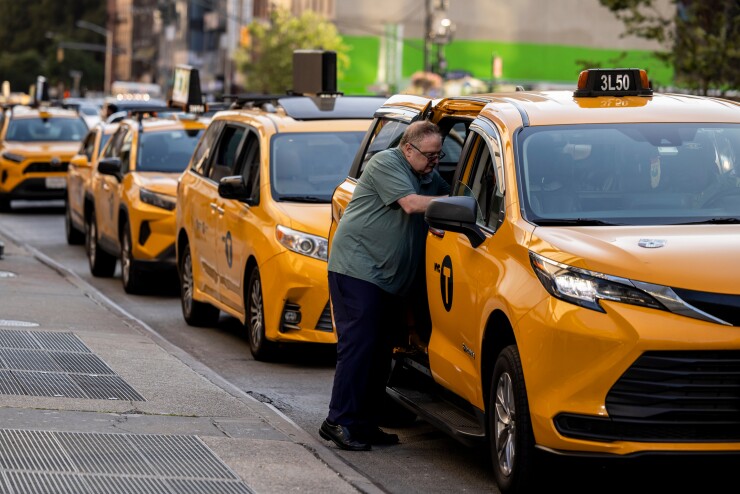Want unlimited access to top ideas and insights?
(Bloomberg) --New York is considering asking property and casualty insurers to cover the claims of insolvent taxi insurer American Transit Insurance Co., according to people familiar with the plans.
That measure is one of several options under discussion as the state's Department of Financial Services — which regulates insurers — grapples with mounting financial troubles at New York City's biggest insurer for taxi and rideshare drivers.
DFS would usually consider drawing from the Public Motor Vehicle Liability Security Fund or the Property Casualty Insurance Security Fund if an admitted insurer in New York is underfunded to meet its upcoming claims.
A potential merger of those two funds was discussed in a November meeting of taxi-industry stakeholders and state officials, said people familiar with the matter, asking not to be identified because the talks were confidential. But their combined $300 million as of
So the state is considering levying a one-time assessment on other insurers to help cover ATIC's claims, according to the people.
"The Governor's office has started to convene stakeholders, including all levels of government, drivers, and the livery industry to discuss the issues and hear their proposals in order to craft a comprehensive plan that protects drivers and passengers and minimizes disruption to livery services," said Kristin Devoe, a spokesperson for New York Governor Kathy Hochul.
While a taxpayer bailout isn't likely, consumers could still end up footing some of the bill if insurers pass on the cost from having to cover for ATIC, according to Matthew Daus, a former commissioner at the Taxi and Limousine Commission regulatory agency. Daus, who is currently a
November Meeting
The potential options to help deal with the ATIC insolvency were discussed at a Nov. 12 meeting that included Adrienne Harris, DFS's superintendent, and Albert Pulido, the state's deputy secretary for finance and technology, according to the people.
Attendees included representatives of Uber Technologies Inc., Lyft Inc., the livery sector and driver groups, the TLC, and the American Property Casualty Insurance Association, according to one of the people.
With most insurance policies renewing next February, the state also discussed at the meeting other options to keep the industry healthy and attractive for carriers going forward, including ways to reduce insurance fraud, the people said.
The meeting, which lasted for hours, didn't yield any final decisions, but the state has asked attendees to submit proposals in writing, according to the people. Uber, Lyft and the New York Taxi Workers Alliance confirmed they attended the meeting.
While ATIC has said it's working to restore its longstanding issue of solvency so that the broader market isn't negatively affected, DFS has also
At least two firms
But DFS told attendees at the November meeting that it has not yet received any credible offers, one of the people said.
Separately on Wednesday, NYC's taxi regulator held a public hearing on changes it plans to make to require taxis and rideshare vehicles to be covered by an insurance policy issued by a "solvent and responsible" company. Uber
TLC Commissioner David Do said the rules "will continue to allow American Transit to renew and issue new policies as long as they follow the DFS rules and procedures." His agency will continue to work with the DFS and state policymakers "to support the long-term stability of the taxi and for-hire insurance market," he said.






